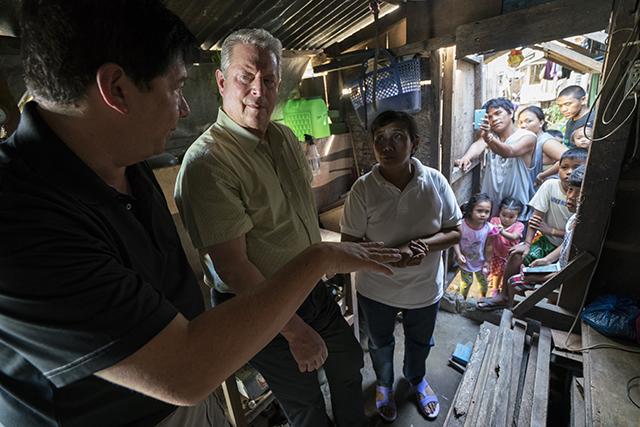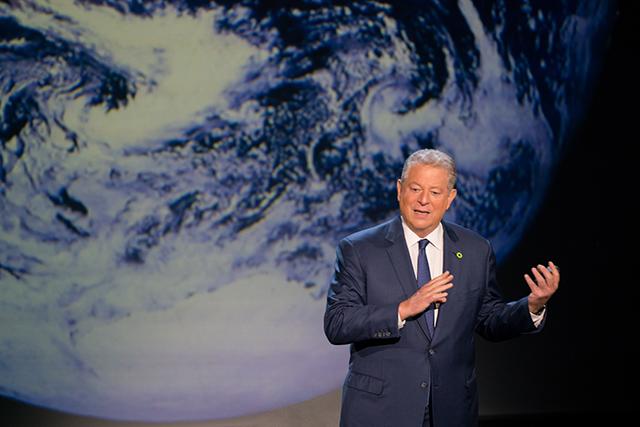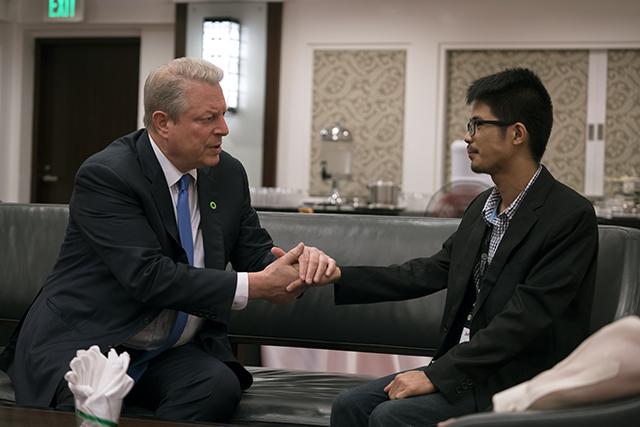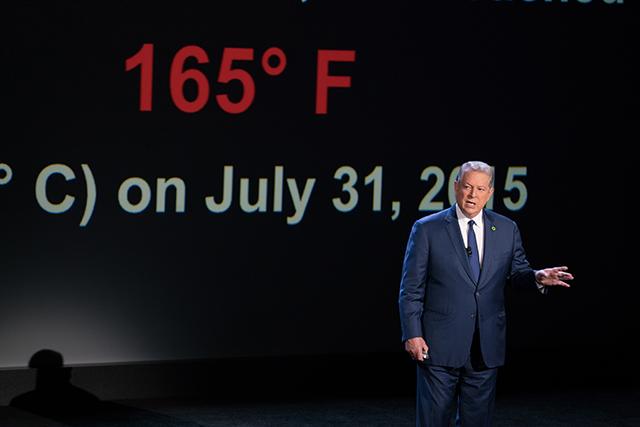Four Reasons to Go See Al Gore’s Hopeful, Compelling An Inconvenient Sequel: Truth to Power
by Stuart Winchester, Viacom
Originally published on Blog.Viacom
An Inconvenient Sequel: Truth to Power rattles out of a world where typhoons and wildfires wail and rage, where warm climate-fueled Zika virus menaces an ever-widening swath of the globe, where streets melt in India, where the coastal United States is swamped on normal days (sunny day flooding in Miami) and extraordinary ones (Hurricane Sandy in New York City).
Directed by Bonni Cohen and Jon Shenk, Al Gore’s sequel to his Oscar-winning 2006 An Inconvenient Truth hits just two months after President Donald Trump pulled the U.S. out of the 195-nation Paris climate agreement. While the timing of the film’s release is coincidental, An Inconvenient Sequel acts as an emphatic counterpoint to the climate-denying, march-with-fingers-in-our-ears-saying-la-la-la-as-the-planet-catastrophically-warms crowd. Here are four reasons to go see it as soon as possible:
1) The documentary frames climate change in an easy-to-understand way
One of the great strengths of An Inconvenient Truth was its distillation of a complex global phenomenon into black-and-white data points. While the sequel has dispensed with the Power- Point-as-documentary narrative device of its predecessor, Gore nonetheless synthesizes the intricate into the straightforward, this time with a blend of graphics and anecdotes
“The man is wonky, no question. But that’s what has made his climate-change crusade persuasive for so many,” writes Bob Mondello on NPR.org. “He gets the figures, turns them into easily digested factoids, says things that initially sound outrageous, and handles the pushback. … The single most exhilarating moment may come from a bar graph — seriously, you’ll want to cheer — but there’s no shortage of human stories on screen: The woman whose shoe gets stuck in pavement that’s melted from the heat.”
That is not to say that the film is without nuance. When Gore evacuates from his Paris venue as ISIS-affiliated terrorists slaughtered 130 people around the city in November 2015, it inspires a cause-and-affect musing that lays out the complexity of the global climate jigsaw puzzle: a drought in Syria led indirectly to social upheaval and civil war, which pried open the social order enough to let ISIS thrive and propagate throughout the world.
2) Climate change is not a partisan issue
Dale Ross is a proud Republican-voting Texan, mayor of Georgetown, “the reddest city in the reddest county in Texas.” And yet, he has oriented his city to become the first in the state that will be 100 percent renewable. Asked why, he said that it simply made economic sense to do so.
“It’s a heartening moment at a time of horrendous political division, but it’s also central to the movie’s approach, which is to insist on facts over ideology and show why it’s a good idea to present the practical as well as the moral argument,” writes Newsweek’s Charles Taylor.
By stripping out partisan moralizing and reframing the argument in economic terms, Gore is both conceding Republicans’ economy-first argument and providing them an excuse to reconsider alternative energy sources without having to admit that such actions could forestall a climate shift. Who cares, after all, when your utility bills are lower?
The filmmakers acknowledge this partisan reality mostly by ignoring the political debate. Aside from a montage of vociferous conservative denunciations of An Inconvenient Truth, (and despite the fact that the oil-loving Republican super-donors the Koch Brothers regularly needle Gore by flying a hot air balloon over his Tennessee home), the film stays focused on facts-on-the-ground depictions of the consequences of ever-more-severe weather.
“We made a decision early on that the film was not going to be about climate change denial,” Cohen told The Boston Globe’s Peter Keough. “We wanted to recognize what happened between 2006 and the present in the world, and to Al Gore specifically . . . but more importantly bring people back to the reality of the world that we’re in now.”
And that reality is a powerful one. When conservative pundits excoriate Gore for his blasphemous suggestion in An Inconvenient Truth that rising seas may one day flood the World Trade Center Memorial in lower Manhattan, there is really no other response than to show that exact site filling with Hudson River water during 2012’s Hurricane Sandy.
3) Al Gore is a climate change folk hero
Prior to 2006, Gore was probably best known as the man who, “used to be the next president of the United States,” as he likes to joke when he opens a lecture. By helping to elevate climate change to a first-tier global political issue – one potent enough to unite nearly every nation in the world around that Paris climate agreement – he is now regarded by many as the swashbuckling hero of global warming crime fighters, a man relentlessly committed to his cause.
“In a summer movie landscape with Spider-Man, a simian army waging further battle for the planet and Charlize Theron as a sexy Cold War-era superspy, it says something that one of the most compelling characters is Al Gore,” writes Ben Kenigsberg in The New York Times “Now gray-haired and at times sounding angrier in his speeches, Mr. Gore takes on the air of a Shakespearean figure, a man long cast out of power by what he casually refers to as ‘the Supreme Court decision’ (meaning Bush v. Gore) but still making the same arguments that have been hallmarks of his career.”
Indeed, Gore seems tireless. He gives well-attended lectures around the world and trains large groups to give the talks in his stead. A good portion of the film portrays his ceaseless deal-working as self-appointed global ambassador for climate change. He stalks about the world meeting with officials, his talking points on genial machine gun repeat.
Never is the regard with which he’s held more evident than when he is working the halls of the Paris convention center where the final climate pact came together, where he acts as a crucial mediator between Solar City (a solar panel manufacturer now owned by Tesla), and India, the world’s second-most populated nation and one whose rapid industrialization threatens to exasperate climate change even more.
4) If you’re worried about climate change, this film will make you feel better
Most of the grim statistics Gore articulated in his 2006 classic have only grown more pronounced since: temperatures and carbon dioxide levels have continued to increase, while the volume of polar ice has decreased. This forlorn iteration does not deter Gore.
“Still, Gore’s optimism seems nearly unflappable. Although he concedes there have been ‘times when it looked bleak and dark,’ when he thought ‘we could lose this,’ Gore has put his faith in an increasingly powerful economic force: renewable energy,” writes Scientific American’s Annie Sneed. “He may have good reason for hope. Market dynamics are pushing the coal industry out of business, and driving natural gas and renewables to the forefront—sometimes in surprising places.”
After the United States pulled out of the Paris agreement, Cohen and Shenk revised the film to address what they saw as the president’s folly. With the entire world uniting onscreen to address a problem that is more urgent every year, and in more tangible and frightening ways, the film will do much to reinforce the convictions of climate change warriors that they are on the right side of history.
“The movie is a piece of advocacy, and it succeeds at that: The conclusive science presented is powerful evidence that there is only one side to this story,” writes Newsweek’s Taylor.
Viacom is uniting its other brands behind Paramount for the company-wide “An Inconvenient Week,” a digital, social and on-air effort that will span 10 television networks – MTV, VH1, Logo, Comedy Central, Spike, BET, CMT, TV Land, Nick@Nite, and Teen Nick – with the centerpiece being An Inconvenient Special, a town hall forum airing on MTV on Wednesday, August 2 at 7:30 p.m. ET.
Hosted by MTV News’ Gaby Wilson in front of a live audience from the network’s Times Square studio, the special will feature an appearance by deejay and producer Steve Aoki and a Miami field piece starring Fat Joe and 17-year-old climate change activist Delaney Reynolds.
An Inconvenient Sequel hit theaters in New York and Los Angeles on Friday, July 28, and went onto a wider release on August 4.





